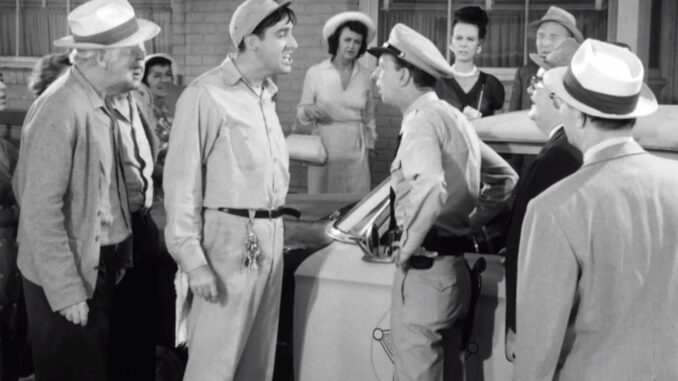
Lines Are Drawn When Barney Tickets Gomer
In the sun-drenched, seemingly eternal afternoon of Mayberry, a simple act reverberates with the profound weight of human experience: Barney Fife, zealous in his duty, tickets Gomer Pyle for a minor infraction. On the surface, it’s a sitcom gag, a clash of endearing archetypes. But beneath the surface, a deeper truth emerges, a universal principle about the often-painful, yet ultimately defining, moments when lines are irrevocably drawn. "Lines are drawn when Barney tickets Gomer" becomes a poignant metaphor for the shift from implicit understanding to explicit consequence, marking the moment when the informal fabric of a relationship, a community, or even an individual's perception of reality, is stretched taut, sometimes to breaking point, by the imposition of formal rules.
Before the ticket, there exists a Mayberry-esque Eden, a realm of unwritten compacts and assumed goodwill. Gomer, with his guileless spirit and boundless optimism, operates in a world where intent trumps protocol, where a friendly wave suffices where a blinker might be required. His existence is woven from the gossamer threads of communal trust, where everyone knows everyone, and minor transgressions are either overlooked or handled with a gentle, personal word. This is the realm of the unspoken, the implicit, where the very idea of a “line” is an abstract concept, dissolved in the warm, familiar current of everyday life. Barney, too, belongs to this world, yet he carries within him the nascent seed of the formal. He is the potential for the rule, the embodiment of the system waiting for its cue. His internal conflict, often comedic, hints at the tension between the personal and the professional, the heart and the handbook.
The moment Barney produces that ticket, the world fundamentally shifts. It’s a surgical incision into the informal. The clank of the coin into the meter, the tearing of the paper, the scratch of the pen – these are not just sounds; they are the audible drawing of a line in the sand. Barney, in that instant, ceases to be merely a friend, a neighbor, or even a comical figure. He becomes an agent of the system, a functionary of the law. Gomer, too, is transformed, from an innocent enjoying the freedom of the Mayberry streets to an "offender," a recipient of a formal judgment. The act of ticketing is inherently impersonal, even when performed by someone deeply personal. It dictates a boundary that was previously invisible, transforming shared space into regulated territory.
The immediate aftermath is often characterized by a bewildering mix of hurt, betrayal, and a stark awakening. Gomer's perplexed "Shazam!" or "Gaw-lee!" isn't just surprise; it's the dawning realization that the rules, which he perhaps vaguely acknowledged but never truly felt applied to him, are now concrete, enforceable, and capable of inflicting real consequences. This is the loss of innocence, not in the moral sense, but in the practical understanding of the world. The idyllic bubble of implicit understanding has burst, revealing the underlying structure of regulations and their inevitable enforcement. For Barney, it’s a moment of duty, but often laced with a poignant understanding of what has been sacrificed – a sliver of the old Mayberry, a piece of the unburdened ease he cherishes.
This "Barney tickets Gomer" phenomenon plays out endlessly across the human landscape. In friendships, a line is drawn when a casual borrowing becomes a demand for repayment, when a shared confidence is broken, or when an unspoken expectation is violated, requiring a formal apology or a definitive boundary. In professional settings, it's the moment when a long-standing, informal work arrangement is replaced by a new policy, when a lenient boss suddenly enforces strict rules, or when a casual chat transforms into a formal performance review. In families, it could be a parent finally enforcing a long-ignored curfew, or siblings finally articulating a long-simmering resentment, bringing previously implicit dynamics into sharp, uncomfortable focus. On a societal level, it’s the shift from customary law to codified statutes, from community consensus to police enforcement, from fluid borders to rigid national boundaries. Each instance marks a necessary, though often painful, evolution from the fluid to the defined.
Ultimately, while the drawing of lines can feel like a loss – a chipping away at the spontaneity and warmth of unburdened interaction – it is also an act of clarification and, often, a prerequisite for growth. Lines, once drawn, define the parameters of interaction, create predictability, and protect individuals from the excesses of unchecked informality. They introduce structure, fairness, and accountability. The Mayberry that emerges from Barney’s ticketing of Gomer is more complex, perhaps less purely innocent, but it is also a Mayberry grappling with the realities of community, responsibility, and the inevitable necessity of order. The melancholy resides not in the act itself, but in the bittersweet recognition that paradise, whether personal or communal, is always tempered by the realities of rules, and the enduring truth that even in the most idyllic of settings, the law, eventually, comes to town. And sometimes, it comes with a ticket.